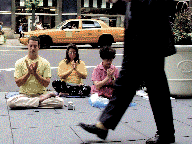The Jewish Week: The Israeli Falun Gong
October 1, 2004
|
|
On a recent Monday afternoon, the corner of 42nd Street and Third Avenue is its usual deafening pandemonium of cabs, cars, trucks, pedestrians, peddlers and police officers. Yet, in the middle of the din, on the sidewalk, Lori Har-El, 40, sits in silent contemplation. She is meditating, barefoot, eyes shut, expression blank. She was born in Israel and lived on a kibbutz, but now she is one of the leading practitioners in New York of Falun Gong, the Chinese practice of meditation.
In recent years, the Falun Gong have been persecuted by the Chinese government, its members arrested and tortured. Sitting on the sidewalk, Har-El and a slew of other practitioners -- some of them Israelis who have traveled here recently to raise awareness of the Falun Gong's persecution -- are surrounded by a macabre display of faux torture scenes.
Such scenes have recently become a fixture on Manhattan streets; they include practitioners locking themselves in cages, painting their faces and their clothes with fake blood, and displaying graphic images of torture victims. The bluntness, Har-El noted, is meant to shock people into recognition of the persecution.
"The persecution is five years old," she says, "and we have tried through the years to let the world know what's going on, very gently -- I guess too gently. We realized that it's time to really bring it out, be here more strongly."
Har-El discovered Falun Gong by accident. After completing her army service in Israel, she came to New York, looking for adventure. She took on a string of jobs, including one working with the Conference on Jewish Material Claims Against Germany. Then, one day, as she was taking the ferry from her Staten Island home to Manhattan, she was greeted at the dock by a smiling Falun Gong practitioner who handed her a pamphlet. The method's credo, stressing truthfulness, compassion and forbearance, appealed to her. Still, her inner-Israeli raised some doubt.
"I didn't want to be a fryier," she says, using the quintessentially Israeli word meaning sucker. "I wanted to see where the money goes in this movement. Then I found out it goes nowhere. There is no money. There's no movement, no registry involved. Everything is voluntarily. It's very hard for people to grasp that."
Thus convinced, Har-El began to practice the Falun Gong's five exercises of meditation. Within a short time, she says, she began to feel much better. "I was even able to quit smoking," she says. As she became more involved with the practice, however, she also became increasingly aware of the fate suffered by its adherents in China. This, she says, appealed directly to her Jewish consciousness.
"I think Jews should understand better than anyone else that we must stop this persecution," she says. "We can't let this continue." The comparison with the Holocaust is one Har-El meticulously avoids, yet one whose shadow nonetheless looms over her rhetoric. "Having worked at the Claims Conference," she says, "I became acutely aware, for example, of the issue of slave labor. I look at China, and the same thing is happening there to Falun Gong members arrested and sent to camps. It's a persecution not of six million, but of a hundred million people."
Sitting next to her, Har-El's Israeli friends nod in agreement. They belong to a group of a hundred or so Israeli Falun Gong practitioners. Some of them, like Millie Koretsky and David Bershadsky, immigrated to Israel from Russia. The persecution in Communist China, they said, evokes in them not only the Holocaust but also Stalin's purges.
With dewy eyes and a faltering voice, Koretsky tells of her grandfather, a wealthy and observant Jew sent to prison for most of his life. "When he came back we didn't even recognize him," she said. "He was a broken man."
For Koretsky, she says, protesting the persecution in China is as much a personal matter as it is one of universal justice. "I understand the Chinese practitioners," she says. "The way the government takes them away in the middle of the night is just like how the Soviets took my grandfather."
Listening to Koretsky's account, Har-El nodded her head, her radiant, lunar features crinkling in pain. "We must stop this," she mutters, more to herself than to anyone in particular. "We must stop this now."
Source http://www.thejewishweek.com/news/newscontent.php3?artid=9919
